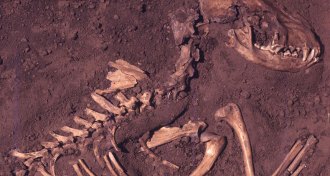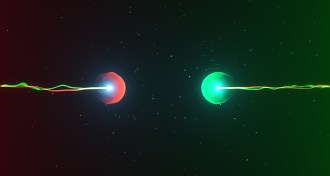Uncategorized
-
 Archaeology
ArchaeologyThis ancient Maya city may have helped the Snake King dynasty spread
A rural hub in an ancient Maya state gets its due with some laser help.
By Bruce Bower -
 Science & Society
Science & SocietyHere’s why putting a missile defense system in space could be a bad idea
Expanding missile defense capabilities could put the world on a slippery slope to space warfare.
-
 Materials Science
Materials ScienceA new plastic film glows to flag food contaminated with dangerous microbes
Plastic patches that glow when they touch some types of bacteria could be built into food packaging to reduce the spread of foodborne illness.
-
 Archaeology
ArchaeologyDogs lived and died with humans 10,000 years ago in the Americas
Dogs unearthed at sites in Illinois were older than originally thought.
By Bruce Bower -
 Space
SpaceLasers squeezed iron to mimic the conditions of exoplanet cores
In the first experiment to measure what exoplanets might be like on the inside, scientists hit iron with 176 lasers at once.
-
 Math
Math‘Weird Math’ aims to connect numbers and equations to the real world
The book Weird Math attempts to make chaos theory, higher dimensions and other concepts more relatable.
By Diana Steele -
 Tech
TechThe Facebook data debacle may not change internet behavior
In the wake of the Facebook data breach, personal privacy experts say there’s little individuals can do to control their personal information online.
-
 Climate
ClimateCargo ships must cut their emissions in half by 2050
A new international agreement places a cap on greenhouse gas emissions from international cargo ships.
-
 Archaeology
ArchaeologyTales of rampant suicide among Custer’s soldiers may be overblown
Few of Custer’s men killed themselves in the face of overwhelming Native American numbers at the Battle of the Little Bighorn, skeletal data suggest.
By Bruce Bower -
 Health & Medicine
Health & MedicineThis is how norovirus invades the body
Norovirus targets a rare type of gut cell, a study in mice finds.
-
 Genetics
GeneticsSweet potatoes might have arrived in Polynesia long before humans
Genetic analysis suggests that sweet potatoes were present in Polynesia over 100,000 years ago, and didn’t need help crossing the Pacific.
By Dan Garisto -
 Chemistry
ChemistryUsing laser tweezers, chemists nudged two atoms to bond
This is the first time researchers have purposefully combined two specific atoms into a molecule.